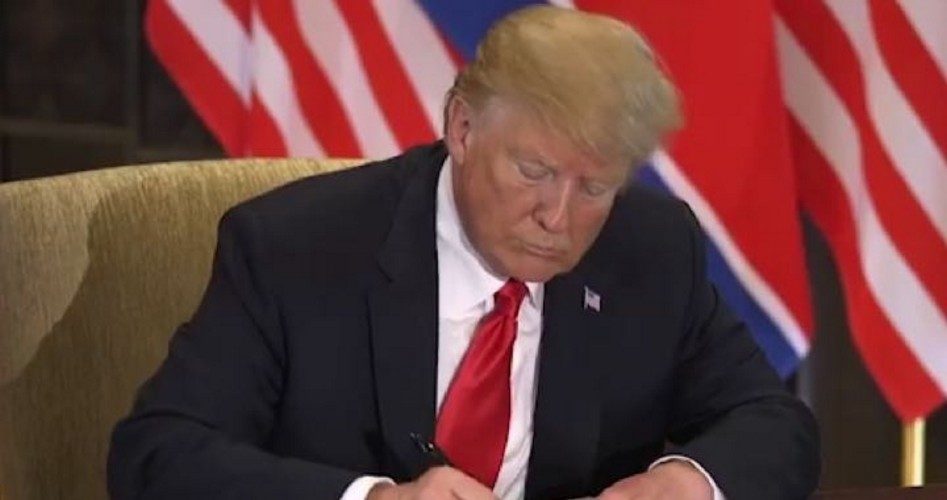
Despite President Donald Trump’s pre-Christmas announcement that the United States would begin pulling out its entire military force of 2,000 out of Syria as quickly as possible, it now appears that he has been persuaded otherwise by some of his foreign policy and national security staff. Trump’s national security advisor, John Bolton, announced on Sunday that before that happens, certain assurances must be obtained from some of the various players in the region.
“Timetables or the timing of the withdrawal occurs as a result of the fulfillment of the conditions and the establishment of the circumstances that we want to see,” Bolton said. “It’s not the establishment of an arbitrary point for the withdrawal to take place as President Obama did in the Afghan situation.… The timetable flows from the policy decisions that we need to implement.”
According to Bolton, Trump told President Recep Tayyip Erdogan of Turkey that before American forces execute the withdrawal, the Turks will have to assure America that Kurdish fighters, who have been important allies in the battle against ISIS, will be unmolested. The Turks and the Kurds have long been at odds, highlighting the intricate politics of the Middle East.
Erdogan said last month that he considered some Kurdish rebels to be terrorists, and a threat to Turkey, arguing that is justification for a Turkish incursion into northeastern Syria. Meanwhile, Syrian government forces have moved into position to protect the Kurds.
When Trump initially announced the exodus from Syria, Senator Rand Paul (R-Ky.), one of the most noteworthy noninterventionist members of Congress, applauded the move, saying that he was “happy to see a President who can declare victory and bring our troops out of a war. It’s been a long time since that has happened.”
Apparently, it still has not happened — at least not yet.
Trump’s announcement that U.S. forces would be leaving Syria precipitated the resignation of his secretary of defense, Jim “Mad Dog” Mattis. Mattis said in September of last year, “Getting rid of the caliphate doesn’t mean you then blindly say okay, we got rid of it, march out, and then wonder why the caliphate comes back.”
Under Mattis’ reasoning, U.S. forces would never leave Syria because there could always be chance that “the caliphate comes back.” It is reminiscent of the words of the late Senator John McCain who said that America might have a military presence in Iraq for a hundred years. Bolton, however, did say that, while there is no set timeline for the ultimate withdrawal of U.S. forces from Syria, the time frame for an American exit is not “unlimited.”
While the stated reason for an American military presence in Syria is to defeat ISIS, a goal publicly shared by the Kurds, the Turks, and the Syrian government, the United States has also long advocated the removal of Syrian President Bashar al-Assad. The United States has placed military forces in Syria without permission of the Syrian government, nor any authorization from Congress. Instead, the supposed legal justification for the mission is the 2001 Authorization for Use of Military Force (AUMF), enacted by Congress after the attacks of September 11, 2001 on the Twin Towers in New York City, and the simultaneous attack on the Pentagon, just outside Washington, D.C. But the AUMF only authorized military actions in Afghanistan against the Taliban and al-Qaeda. Obviously, what is going on in Syria has nothing to do with that war, which itself has dragged on for almost 20 years with no end in sight.
Bolton, however, contends the AUMF is not necessary, anyway. “There’s plenty of legal justification about concern for the resurgence of ISIS. But I’m a strong believer in Article II, and I think that what that means is the president has full authority to protect American and allied interests anywhere around the world.”
Under Bolton’s reasoning, the president has unlimited authority to go to war, on his own, without any authorization from Congress. Exactly how Bolton’s view, which is widely shared by interventionists such as himself, is consistent with Article I’s requirement that it takes Congress to declare war, Bolton does not say. But what he does say is the president could bomb Syria, again, simply on the president’s say-so. President Trump won rare praise from the interventionist crowd when he bombed Syria in retaliation for Assad’s alleged use of chemical weapons in the long-running Syrian civil ear. “Any use of chemical weapons will be met by [a] very strong response,” Bolton warned, “as we have done twice before.”
Regime change has long been a tactic justified by globalists supporting a new world order. Gideon Rose, editor of the globalist journal Foreign Affairs, explained that “regime change” in any nation that “could not be trusted to participate in [the] collective security system” has been a principle of new world order advocates since the days of Woodrow Wilson. (Some might even argue that an effort at “regime change” is being attempted in our own country, right now).
Globalists often like to cite the supposed authority of the United Nations to circumvent the U.S. Constitution. But the UN charter specifically forbids interference in a nation’s domestic affairs. Article 15(8) of the Covenant of the League of Nations, Article 2(7) was inserted in the United Nations Charter to limit the authority of the organization in respect to disputes that are essentially within the domestic jurisdiction of the member states. Of course, much like the disrespect given to following the U.S. Constitution whenever it inhibits what progressives want to do, such provisions found in the UN Charter that ostensibly limited UN jurisdiction are regularly ignored when they inhibit the goals of globalist-minded politicians in the United States and in other countries.
President Trump’s initial instincts were correct, and the best thing that could happen in Syria is for all forces of all non-Syrian nations to leave the country.


